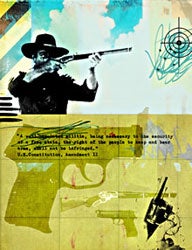When the U.S. Supreme Court took up a landmark case on the constitutionality of Washington, D.C.’s handgun ban in March, a trio of Harvard Law students could claim modest credit for helping shape the argument. The students assisted lawyers arguing for preserving the ban in the gun-control case—D.C. v. Heller—as part of their work in a new clinical course this year, Supreme Court and Appellate Litigation.
The course is being supervised by Walter Dellinger, the former acting solicitor general in the Clinton administration and a leading Supreme Court advocate, one of the lawyers in the case.
In the yearlong clinical run by Dellinger and two fellow attorneys from the law firm O’Melveny & Myers—Pamela Harris and Jonathan Hacker—a dozen students have gathered every other week for class sessions covering every aspect of appellate litigation, from writing amicus briefs to the art of oral argument, from dealing with factual records to the role and function of the Solicitor General’s Office.
Outside of class time, the students have worked on cases winding their way through the Supreme Court and U.S. Circuit Courts of Appeals.
For the D.C. gun case, three students did research to help the lawyers formulate their arguments and write the brief. Matt Perault ’08 examined the evolution of state militias and the National Guard from precolonial times. That assignment took him out of his usual setting in the law school library to Harvard’s Widener Library, where he unearthed works of history that might help the advocates’ cause.
Perault recognized signs of his research in a small section of the brief filed with the Court, addressing the interpretive value of preambles. He and his teammates also helped edit two drafts of the brief. “It’s a fantastic case to be involved in,” he said.
Hacker, one of the O’Melveny lawyers who helped co-teach the class, says the students provided invaluable assistance. “They offered really good thinking, helpful research and, even after the brief was over, [helped] in thinking over questions and argument strategies and new kinds of arguments,” he said.
Hacker may be an experienced appellate advocate but said he, too, learned much from the experience: “In my daily practice, it’s not like I think in a specific way about what is the philosophy behind amicus briefs or what we’re trying to accomplish. It’s taught me a lot in thinking how to achieve results by putting together my class on amicus strategy.”
Not every case, of course, is quite as historic. But students say they’ve also enjoyed working on less prominent cases. Michael Bern ’08 examined the history of the First Amendment’s religion clause in a 10th Circuit case challenging Colorado’s school aid program over its exclusion of sectarian colleges.
Elizabeth Barchas ’08 helped a Texas federal public defender research issues for a brief on the meaning of the concealment element in the federal money laundering statute. And, in a brief for the National Association of Criminal Defense Lawyers, she explored whether an appellate court can sua sponte increase a defendant’s sentence when not pressed to do so by the government.
“It was as if we were part of the firm preparing the brief, going through that process from beginning to end,” Bern said.
